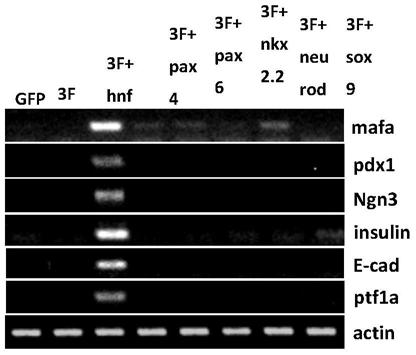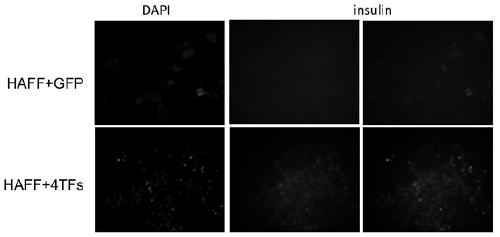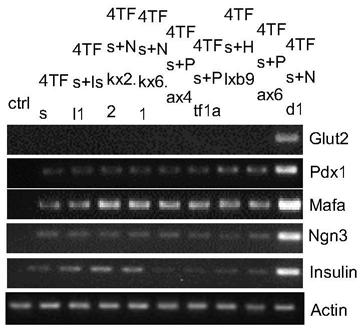A method for inducing insulin-secreting cells based on human skin cells and its application
A technology of insulin secretion and skin cells, applied in the field of molecular cytology, can solve the problems of single cells, cumbersome directed differentiation steps, and lack of complete function of pancreatic islet beta cells
- Summary
- Abstract
- Description
- Claims
- Application Information
AI Technical Summary
Problems solved by technology
Method used
Image
Examples
Embodiment 1
[0033] Example 1 Induction of Exogenous Transcription Factor Infection of Human Foreskin Fibroblast Insulin-secreting Cells
[0034] In this example, the inventor first constructed the gene into the lentiviral vector Psin, and transfected it with PMD2G and PSPAX2 packaging plasmids in 293T cells, with a transfection ratio of 2:2:1. Viruses were harvested 48 hours after virus transfection. The virus was infected into human fibroblasts, and the medium was changed after 24 hours. Two days after the cells were infected with the virus, they were cultured using a specific medium (IMDM+1×ITS+10ng / ml EGF+10ng / ml bFGF).
Embodiment 2
[0035] Example 2 Determination of insulin secretion
[0036] RT-PCR experiment: When the virus infected human fibroblasts for 20 days, the collected cells were lysed with Trizol, RNA was extracted, RNA was reverse-transcribed using a reverse transcription kit, PCR was used to perform PCR on related genes, and electrophoresis was used to detect , to observe the expression levels of related genes. Such as figure 1 shown.
[0037] Cellular immunofluorescence: when the virus infected human fibroblasts for 20 days, the cells were fixed with 4% paraformaldehyde (PFA) for 10 minutes, Triton-100 was perforated for 15 minutes, 2% BSA was blocked and incubated for 1 hour, and the primary antibody (buffer was 2% BSA) for 2 hours, ALEXA-secondary antibody (secondary antibody with fluorescence) for 1 hour and then mounted. Insulin production was observed under a fluorescent microscope, as figure 2 shown.
Embodiment 3
[0038] Example 3 Cellular glucose response experiment
[0039] The RT-PCR experimental steps are as implemented in 2, and the results are as follows image 3 shown.
[0040] Cell immunofluorescence experimental steps are as in implementation 2, and the results are as follows Figure 4 shown.
[0041] Insulin secretion experiment in vitro: the cultured cells were firstly washed with KRB buffer several times. Then pre-incubate KRB buffer containing 2 mM glucose for 2 hours to remove insulin remaining in the medium. The cells were washed twice again with KRB buffer, then incubated with KRB buffer containing 2mM glucose for 30min, and the supernatant was collected. Then the cells were washed twice with KRB buffer again, then incubated with KRB buffer containing 20 mM glucose for 30 min, and the supernatant was collected. Cells were quantified by BCA method for protein standard; human insulin detection kit was used to detect the level of insulin released by cells under 2mM glu...
PUM
 Login to View More
Login to View More Abstract
Description
Claims
Application Information
 Login to View More
Login to View More - R&D
- Intellectual Property
- Life Sciences
- Materials
- Tech Scout
- Unparalleled Data Quality
- Higher Quality Content
- 60% Fewer Hallucinations
Browse by: Latest US Patents, China's latest patents, Technical Efficacy Thesaurus, Application Domain, Technology Topic, Popular Technical Reports.
© 2025 PatSnap. All rights reserved.Legal|Privacy policy|Modern Slavery Act Transparency Statement|Sitemap|About US| Contact US: help@patsnap.com



